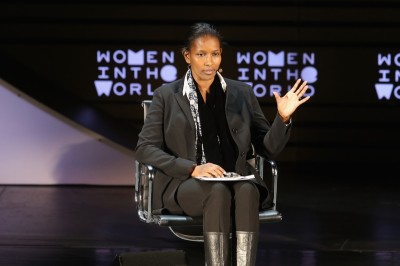How do you know you’re not wrong?

Ayaan Hirsi Ali, who is a Somali-born, writer, activist, and former politician, used to be a Muslim. Then she was an atheist. Now she says she is a Christian.
How does she know she’s not wrong this time?
Famed atheist Richard Dawkins thinks she is. On a recent podcast with The Cosmic Skeptic, Alex O’Connor, entitled “Religion is still Evil,” Dawkins, who counts Ali a friend, said he concedes she genuinely believes her faith is true but that her belief is driven by certain motivations that cloud her intellectual inspection of Christianity.
“For her what really matters is the morality, the politics actually. I think, for her, Christianity is a bastion against something worse. For her, I think she wants a faith which will help people to stand up against worse faiths.”
Dawkins then goes on to say: “That’s the wrong way to approach religion. What really matters about religion is whether it’s true.”
He’s right.
Dawkins could be wrong about why Ali has embraced Christianity (she talks about her journey here), but he’s correct about the only reason we should believe anything is because it’s true.
Ok, sounds good, but how does Dawkins know he’s not wrong about atheism (he says science directs him there)? How do I know I’m not wrong about the Christian faith?
There are a plethora of reasons why we can get turned around and hold false beliefs. Instincts and intuitions that can be incorrect; custom and tradition; what’s called consensus gentium (“content of the nations”) meaning something that the world at large believes at the time. The big ones today are feeling, desire, preference, and pragmatism (if something seems to “work” it must be true).
So, if we can’t rely on those things (and we can’t) and we don’t want to be lazy like some who claim “there is no evidence for ” when there usually is, what do we do? The area of study known as epistemology (how we know and how we know that we know) is massive and there are many tributaries of thought in the field, which can make it confusing.
Well, luckily you have me and I have all the answers.
Actually, I don’t, and won’t pretend that I do. However, I did come across a litmus-testing process a while back that still makes good sense to me, so let’s see what you think; hopefully it will be of some help to you when it comes to qualifying in/out false beliefs.
The worldview lie detector
Edward John Carnell was one of those guys who was ahead of his time when critical thinking and the truth about religion were concerned. Earning Ph.D.s in both theology and philosophy from Harvard and Boston University, Carnell went on to write several books on apologetics and the philosophy of religion.
Carnell developed a framework for filtering out false worldviews and religions that included what he called the Systematic Consistency test where something must be both logically consistent and be able to explain all the relevant facts via empirical adequacy. He went on to add existential relevancy to the structure to account for a complete worldview — something the Germans call a Weltanschauung.
His worldview lie detector kicks off with logical consistency that asks if the belief system’s teachings logically cohere with one another or if they conflict in logical or rational ways. For example, Buddhism teaches that a person must rid oneself of desire, but don’t you have to have a desire to rid yourself of desire?
Empirical adequacy asks if the beliefs can be reasonably verified or falsified and if the arguments used to support or object to the belief system are intellectually valid. For instance, many non-theists say a supernatural creator can’t exist because there’s evil in the world, but even atheist Richard Dawkins says that’s flawed thinking: “The problem of evil, to me, shouldn’t be a real problem because you just say, ‘Well there’s an evil god’ and so that’s a lesser question.”
Lastly, you have existential relevancy which asks if the claims are existentially relevant and have answers for the core questions of life: Origin, meaning, morality, and destiny. This comes only after validating the first two because, as Carnell warns, “a religion might alleviate people’s anxieties with counterfeit promises.”
So how does Christianity fare in Carnell’s framework? He concludes, “[The] Christian hypothesis is true because without contradiction, it accounts for more empirical evidence … axiological evidence … psychological evidence … ethical evidence … with few difficulties than any other hypothesis.”
Of course, there are plenty who will disagree with him.
While I think Carnell’s system has a lot of merit, I’m the type of guy who tries to simplify things whenever possible. For me, I boil down the question of whether I’m wrong about Christianity to one thing: Was Jesus wrong?
Was Jesus wrong about who He was? Was He wrong about how we should live? Was the Nazarene Carpenter wrong about life and after death … especially His own?
Few, if any, historical documents have been vetted like Jesus’ biographies, so believing we have His words correctly captured as well as any other biographical figure in history is reasonable to assume (see my short presentation on the reasons why). And, as I’ve said several times in the past, if you want to falsify Christianity and immediately send it to the ash heap, you only have to do one thing: produce the body of Jesus.
But His enemies couldn’t do that right after He died, and I don’t expect anyone today will either. Call me crazy, but if I’m going to look to trust someone about matters of origin, meaning, morality, and life after death, I can’t think of anyone better than someone who talked about all that and then came back from the dead to prove His point.
Whatever her initial motivations, Ayaan Hirsi Ali has made her way through the worldview maze and is now on solid ground where the truth about religion and everything else is concerned. She’s finally entered through that narrow gate that leads to life and has now become one of the few who have found it.
And I know she’s not wrong.
Robin Schumacher is an accomplished software executive and Christian apologist who has written many articles, authored and contributed to several Christian books, appeared on nationally syndicated radio programs, and presented at apologetic events. He holds a BS in Business, Master's in Christian apologetics and a Ph.D. in New Testament. His latest book is, A Confident Faith: Winning people to Christ with the apologetics of the Apostle Paul.



























